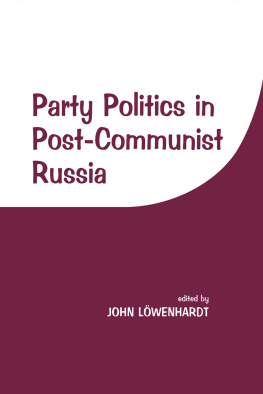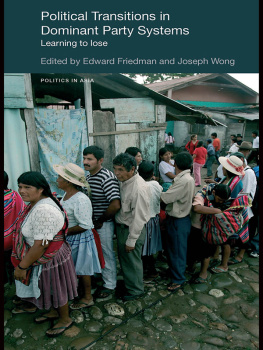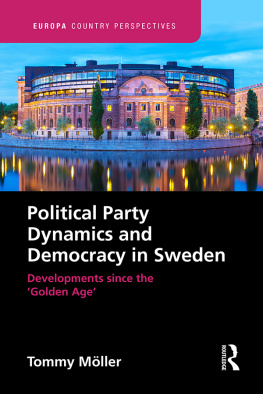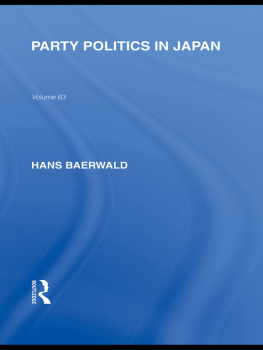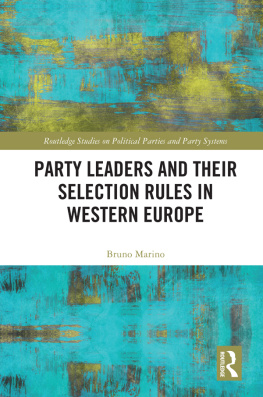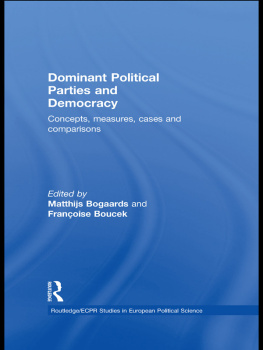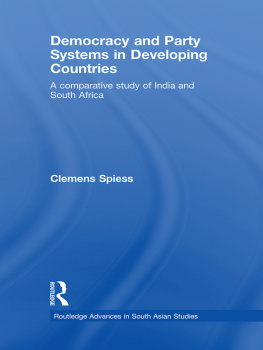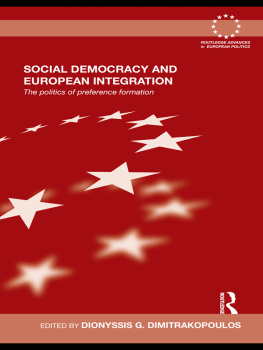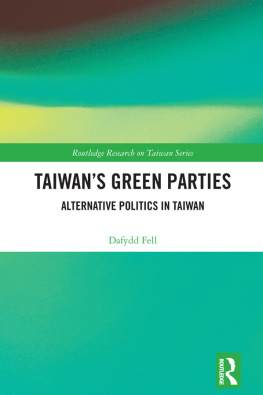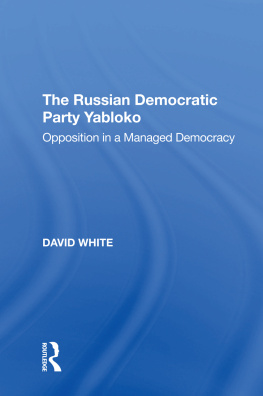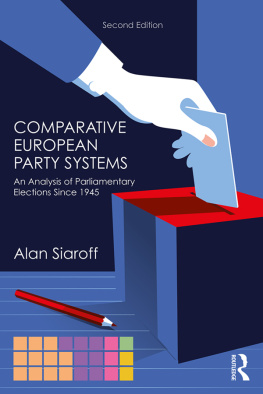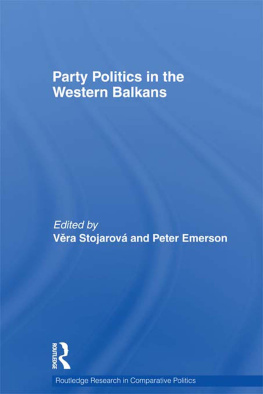Of Related Interest
BEYOND STALINISM: COMMUNIST POLITICAL EVOLUTION
edited by Ronald J. Hill
THE SOVIET TRANSITION: FROM GORBACHEV TO YELTSIN
edited by Stephen White, Rita di Leo and Ottorino Cappelli
SOCIAL DEMOCRACY IN A POST-COMMUNIST EUROPE
edited by Michael Waller, Bruno Coppieters and Kris Deschouwer
POST-COMMUNISM AND THE MEDIA IN EASTERN EUROPE
edited by Patrick H. ONeil
PARTIES, TRADE UNIONS AND SOCIETY IN EAST-CENTRAL EUROPE
edited by Michael Waller and Martin Myant
MARKET ECONOMY AND CIVIL SOCIETY IN HUNGARY
edited by C.M. Hann
HUNGARY: THE POLITICS OF TRANSITION
edited by Terry Cox and Andy Furlong
First published in 1998 in Great Britain by
Routledge
2 Park Square, Milton Park,
Abingdon, Oxon, OX 14 4RN
and in the United States of America by
Routledge
270 Madison Ave,
New York, NY 10016
Transferred to Digital Printing 2006
Website: http://www.routledge.com
Copyright 1998 Routledge
British Library Cataloguing in Publication Data
Party politics in post-communist Russia
1. Political parties Russia (Federation) 2. Post-communism Russia (Federation) 3. Russia (Federation) Politics and government 1991
I. Lwenhardt, John
324.247009049
ISBN 0 7146 4892 2 (cloth)
ISBN 0 7146 4443 9 (paper)
Library of Congress Cataloging in Publication Data
Party politics in post-communist Russia / edited by John Lwenhardt.
p. cm.
This group of studies first appeared in a special issue ... of
The journal of communist studies and transition politics, 14/1 & 2,
March/June 1998.
Includes bibliographical references and index.
ISBN 0-7146-4892-2 (cloth). ISBN 0-7146-4443-9 (pbk.)
1. Political parties Russia (Federation) 2. Representative government and representation Russia (Federation) 3. Russia (Federation) Politics and government 1991 I. Lwenhardt, John.
JN6699.A795P375 1998
324.247009049 dc 21
98-16306
CIP
This group of studies first appeared in a Special Issue on Party Politics in Post-Communist Russia of The Journal of Communist Studies and Transition Politics (ISSN 1352-3279) 14/1 & 2 (March/June 1998) published by Frank Cass.
All rights reserved. No part of this publication may be reproduced, stored in or introduced into a retrieval system, or transmitted, in any form or by any means, electronic, mechanical, photocopying, recording or otherwise, without the prior written permission of the publisher of this book.
Publishers Note
The publisher has gone to great lengths to ensure the quality of this reprint but points out that some imperfections in the original may be apparent
Introduction
JOHN LWENHARDT
Towards the end of the twentieth century the people of Russia received the gift of free elections. Mass populations in Western Europe, the United States and Australasia had won the right to take part in collective choice at the beginning of the century. They had a head-start of some eight decades over the Russians. Moreover, in many countries they had been obliged to engage in struggle with the powers-that-be for the piecemeal broadening of the electorate, until finally all adult citizens were drawn into the political process by periodically selecting their representatives and, in some countries, their supreme executive. With the enactment of universal adult suffrage early in the century, popular legitimation through general elections became the prime mode of legitimation of governments to such an extent that ruling parties in dictatorial political systems such as the Soviet Union went to great lengths to design deviously intricate electoral systems meant to mask the absence of choice for the individual voter.
Many millions of people in Russia and elsewhere in Central and Eastern Europe who for all of their adult life had periodically and often cynically gone through the motions of elections without choice (to quote the 1978 study by Hermet, Rose, and Rouqui) were now called upon to take part in collective decisions and to make responsible choices among often utterly confusing alternatives. Although many of them had longed for the opportunity to make themselves heard in the electoral arena (and thereby to receive confirmation of being taken seriously by the political elite), they had no experience of free and fair elections or of their possible consequences. The technicalities were learned easily enough, for the communist regimes had for many decades mimicked free and fair elections, by requiring their citizens to attend polling stations and cast ballots into ballot boxes or urns, signalling their approval of the one candidate permitted to run in each constituency. Now, however, instead of one there were several candidates for each seat: that is, choice. But to adapt their expectations of politics to the new, competitive environment proved to present many more difficulties. Most newly emancipated citizens entered the political arena with romantic
The presidential campaign of 1996 was impregnated with the dilemma of choice. Odd as it may seem, it was precisely this dilemma of having to make a choice among the three alternatives (three, because abstention was a possible escape route) considered to be almost equally repelling that testified to the Russian electorate moving, by small steps, in the direction of normal politics. After all, only a few months later not a few Americans were desolately asking themselves the same question: Clinton or Dole? Political choice is always choice between alternatives almost equally harmful or distasteful or detestable or reprehensible, and the Russians were learning that basic fact of democracy.

